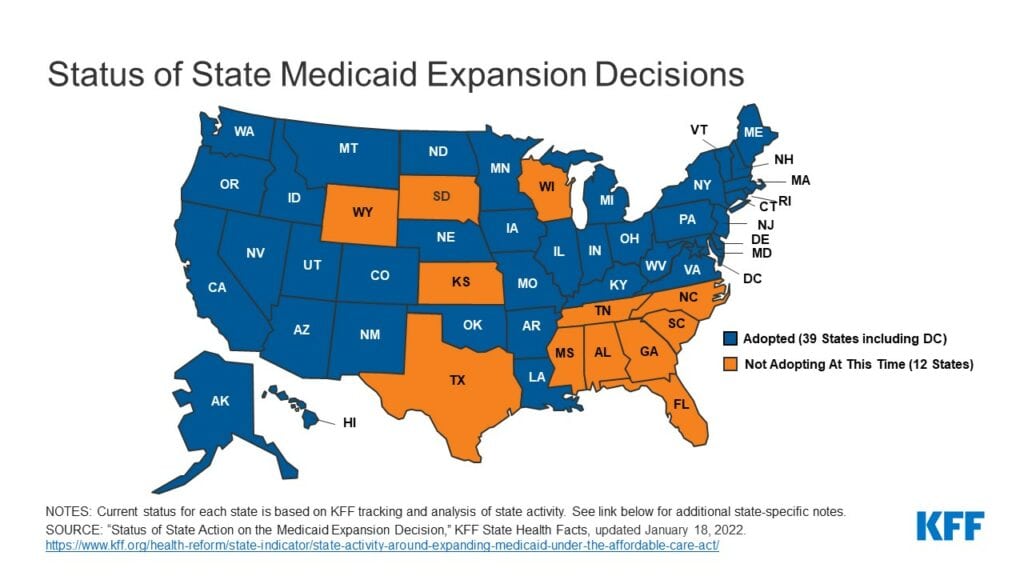The breast cancer community has the urgency of now. Political gamesmanship detracts from the real solutions that people living with breast cancer or other acute or chronic conditions desperately need. They need access to affordable health care and paid time off from work to be able to care for themselves or their loved ones, without fear of losing their jobs.
This past November, the U.S. House of Representatives passed the Build Back Better (BBB) Act. The U.S. Senate’s inaction on the proposal puts millions of Americans at risk on multiple fronts, including their health and lives.
Susan G. Komen supports many provisions in the proposal, especially extending the enhanced premium tax credits to ease the cost burden of health care for those diagnosed and living with breast cancer; closing the Medicaid eligibility gap for over 2.2 million Americans residing in the 12 states that have not expanded it; and creating a national paid family and medical leave program that would support people with serious illnesses, including breast cancer patients and their caregivers.
At the onset of the Affordable Care Act’s (ACA) debate in early 2009, it was estimated that 157 million Americans would be suffering from chronic conditions, including cancer, by 2020. This estimate was made before anyone ever knew there’d be a global pandemic. The COVID-19 pandemic has devastated vulnerable communities, especially the elderly, those with comorbidities, and communities of color. Some of these are the same communities that experience inequities in health care across the board.
While significant advancements have been achieved in the treatment of breast cancer, its incidence is growing and racial and ethnic disparities in mortality are pronounced, particularly for Black women. The American Cancer Society (ACS) estimates that 290,260 people will be diagnosed with breast cancer and 43,780 people will die from the disease in 2022 alone.
For people in the breast cancer community, access to affordable, high-quality health care is essential. Komen supports the provision in the Build Back Better (BBB) proposal that extends the enhanced premium tax credit (PTC) made to the Affordable Care Act (ACA) through the American Rescue Plan in March 2021. This change reduces the out-of-pocket cost of insurance premiums for more eligible families and individuals who access insurance plans through the ACA marketplace.
The health care provisions of the BBB build on policy changes made during the pandemic that have helped to mitigate the impact of COVID-19 on American lives and the economy by making investments over the long haul that would help Americans cope with the most significant challenges of health care –access, cost, and paid time off from work to care for oneself or a loved one. The pandemic has shown that our nation must address systemic issues to keep America safe and the economy working for all.
Komen strongly supports access to health care by closing the Medicaid gap and expanding eligibility to the more than 2.2 million Americans residing in the 12 states that have not yet adopted Medicaid Expansion. In eight of these 12 states, African Americans are already experiencing poorer health conditions and disproportionate outcomes, including for cancer.

People without access to health care are less likely to get annual breast screening, more likely to have late-stage breast cancer diagnosis, and more likely to have a lower five-year plus survival rate. Preventative health is good for improving health outcomes and is also more cost-effective for private and public health systems. Maintaining good health is less costly than treating disease and its ramifications.
Komen strongly supports the creation of a national paid family and medical leave program that would allow people in the labor market to care for themselves or loved ones without fear of losing their job. The current Family and Medical Leave Act allows for up to 12 work weeks of leave without pay in a 12-month period for eligible employees of covered employers. This policy has created a two-tier system where the wealthy or those with financial means are able to take time off without pay for the birth or adoption of a child or care for themselves or a loved one when facing health conditions that require it.
Working people without means cannot afford to take leave without pay and are forced to navigate similar circumstances with little or no support. In fact, during the COVID-19 pandemic in November 2020, the Federal Reserve found that 36 percent of American families could not cover an unexpected $400 expense, such as a medical bill, with cash reserves. Too often, working Americans go to work sick and forgo much needed treatment that would require lengthy periods of time off for fear of losing their jobs.
The United States is one of 11 countries in the world that does not provide paid leave for health problems. In the Americas and the Caribbean, the U.S. joins Haiti and Jamaica in the lack of paid leave for health conditions. Around the world, the U.S. is on par with Somalia, India, Myanmar, and South Korea in denying paid leave to its citizens for health reasons.
Komen believes that paid family and medical leave would improve health outcomes and quality of life for American workers. It could also be a cost-effective solution: the more people employed, the less demand there is for unemployment programs and public assistance programs that put pressure on state and federal budgets. Breast cancer communities and Americans from all walks of life need and deserve a better health care act now. Susan G. Komen and its supporters call on Congress to deliver!
Aracely Panameño is Susan G. Komen’s Director of Federal Policy and Advocacy.



